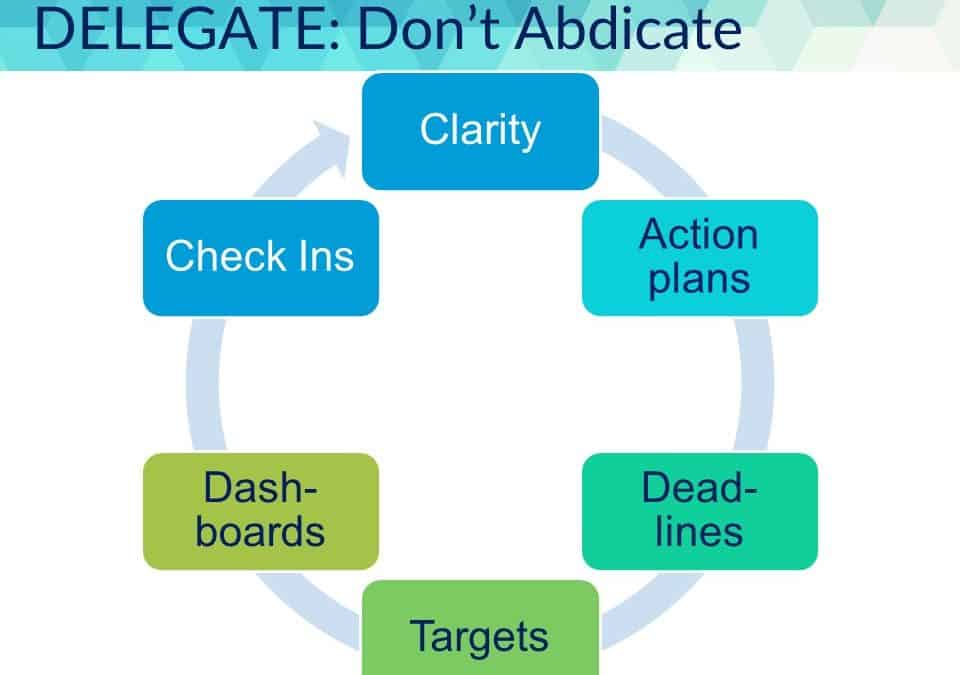
by Diana Southall | Dec 17, 2019 | accountability, coaching, dashboards, performance
As we look to finish the year strong, today I am talking about report cards.
Kids may not enjoy getting them in school, but as a parent, I find them a valuable tool to monitor progress, compare their results to their peers, get feedback when results are not meeting expectation, and to make changes to our process for homework and studying when there is not an “A.”
Yet once our kids graduate and move to the professional world of work, we forget about this useful tool.
Your business has at least one report card – it’s called an income statement [or P&L].
But does every individual in your organization have their own customized report card?
This article from Entrepreneur Magazine explains why every person should have a scorecard/ dashboard/ report card.
Why Every Employee Needs an Individual Scorecard [by Riaz Khadem, published in Entrepreneur Magazine]
Here is an excerpt:
Why is a scorecard for every person in your organization so important?
Because the scorecard connects individuals to your company’s vision and strategy, and when all the jobholders in a company have a scorecard, the entire company is aligned.
With a scorecard defined clearly in measurable terms, and with specific roles identified, people will be focused on the most important activities. Accountability is clear.
But how does this type of business scorecard compare to the individual scorecards we are describing here? There are several important differences.
Let’s take a look.
- Alignment with vision. The alignment to the mission or vision is usually not clear in business scorecards. They’re very clear in the individual scorecard.
- Progress of strategic initiatives. Strategic initiatives are tracked outside of business scorecards within the individual scorecard because the five indicators in the individual scorecard are usually a mix of visual indicators and strategy indicators.
- Concept of roles for indicators. The concept of roles for the indicators doesn’t exist in business scorecards. It does in the individual scorecard and is there to encourage cross-functional collaboration.
- Related: How to Measure the Effectiveness of Your Company’s Vision
- Information on the scorecard. Business scorecards include aggregate consolidated numbers; the individual scorecards show numbers from the source, where performance takes place.
- A number of factors. Business scorecards can have a large number of indicators; the individual scorecard focuses on a few.
To find out how to cascade your business scorecard down to the individual, read about the process in our “Guide to Coach Your Team for Accountability & Performance.”

by Diana Southall | Nov 5, 2018 | accountability, culture
According to a very informative and detailed Harvard Business Journal chapter, there are 8 different and distinct “Cultures” in organizations.
If you are looking to increase your organization’s performance in a positive way, you might choose to shift your culture to include characteristics from both Results and Caring.
Here are some excerpts from the main article, describing both types and how they can be combined:
Results is characterized by achievement and winning. Work environments are outcome-oriented and merit-based places where people aspire to achieve top performance. Employees are united by a drive for capability and success; leaders emphasize goal accomplishment
Caring focuses on relationships and mutual trust. Work environments are warm, collaborative, and welcoming places where people help and support one another. Employees are united by loyalty; leaders emphasize sincerity, teamwork, and positive relationships.
It is common to find organizations with cultures that emphasize both results and caring, but this combination can be confusing to employees.
Are they expected to optimize individual goals and strive for outcomes at all costs, or should they work as a team and emphasize collaboration and shared success?
The nature of the work itself, the business strategy, or the design of the organization may make it difficult for employees to be equally results focused and caring.
Each of the 8 culture types can be effective if properly aligned with strategy and leadership behaviors.
For a small or mid-size organization, much of the direction is set by one or two owners, and based on their personality and core values.
Clarity around the strategy, core values and then the what and how of expected results is imperative for any organization to function at it’s best. That is why many business planning frameworks, such as the One Page Strategic Plan and Entrepreneurs’ Operating System start with Mission, Vision and Values before even defining Strategy.
As Peter Drucker is credited for saying “Culture eats Strategy for breakfast…”
For more inspiration, see this Slideshare overview of 12 Reasons Culture Eats Strategy for Lunch.

by Diana Southall | Jun 1, 2018 | accountability, action plans, Execution, performance, planning
Is it time to focus and finish your projects for this quarter?
Before you answer, click here to read my article from two weeks ago– “Why Aren’t You Finishing Projects (Part 1).”
Here are my thoughts on “Why Aren’t You Finishing Projects – Part 2”:
The main answer is that you are juggling TOO MANY projects.
Below is my graphic explaining another concept from Todd Herman.
This example shows what happens if you juggle 5 projects, versus tackling one at a time:

This shows you the impact of “context switching”– when your brain and effort is spread across multiple things.
As Todd explains it, if it takes 4 hours to finish one project, and you do one hour a week on 5 project at a time, it takes you 16 weeks to finish Project A.
If you work on only Project A, you are finished in 4 weeks.
Now I realize that some projects take more time and require waiting on other people, but I think the concept is pretty clear.
One finished and implemented project is worth 50 started and abandoned ones.
If you need a bit of inspiration/ motivation to keep plugging on Project A, re-read the article PART 1.
So pick one half-finished project and make a commitment to power through and “get ‘r’ done” by the end of the 13-week quarter.
Image from Todd Herman

by Diana Southall | May 25, 2018 | accountability, action plans, Execution, performance, planning
You, small business manager, want to improve things.
I will bet dollars to Freddy’s Famous Buffalo donuts that you have a “wish list” of projects you want to implement, and you have started some of them.
Yet your office (and mine) is littered with books unread, binders from great workshops, possibly brochures or saved emails with a system or process that sounds great. One you want to investigate that just might make your business operate more smoothly or more profitably.
Hey, we are idea people and we are starters (maybe not finishers).
When you do start something new with anticipation, this most likely happens (image from Todd Herman):

One of the most persistent complaints I hear from employees of small business is that “we don’t finish what we start” and that the owners/ managers are always adopting the latest book advice or stuck in chasing shiny objects syndrome.
Making changes, finishing a project or new process, and getting everyone on board and sticking with it is HARD.
You have to be patient and persistent to make progress, and to stay positive with all the set backs and challenges you encounter.
Four things you can do to start and finish your projects:
- Do ONLY ONE at time (more about this next week)
- Enlist the help of your team– don’t do it all yourself
- Create an action plan with weekly action items and assign tasks to specific people with a deadline
- Meet weekly (same time) to review what is complete, what needs to be discussed/ decided, and what is next
As a bonus– get an “Accountability Buddy” outside of your team/ company (a colleague or a consultant) who will hold you accountable to make progress, keep you motivated, and help you work through the inevitable bumps on the road.
Maybe even decide the reward you will give the team to celebrate– such as a “pizza party” or outing or something nice for the office (plants? Fooze ball table?). This can keep you motivated as you slog through the tough parts and keep you sprinting toward the finish line.
Image from Todd Herman

by Diana Southall | May 2, 2018 | accountability, coaching
The most important step in bringing accountability to your team — be Consistent!
If you don’t “inspect what you expect” … then some things will get done, but many will be forgotten.
One of the most persistent complaints I hear from employees of small business is that “we don’t finish what we start” and that the owners/managers are always adopting the latest book advice or stuck in chasing shiny objects syndrome.
Your team needs your consistent follow-up to help them (and you!) build the habits of professional management.
This means committing to and having your weekly (or monthly) one-on-one meetings, your monthly business reviews and your quarterly business planning sessions.
Lots has been written on the psychology of “change” and building habits– it takes 40 days, 10,000 hours of practice to be an expert, etc.
But it’s not rocket science- make a schedule, stick to it, learn from your progress, refine what works for your team and your business and KEEP WITH.

by Diana Southall | Apr 3, 2018 | accountability, Delegation
How often do you ask someone to do something and don’t follow up?
Kings and Queens don’t usually abdicate their throne but managers often do when they delegate a task…
This “delegation” process might sound familiar:
- You casually and quickly mention to someone “I need you to do this ‘thing’ for me.”
- You “hope” the person understands what to do, has the knowledge to do it, will squeeze this new non-urgent task into their busy week, and will make a decision equal to the one you would make.
- And you get busy.. (that’s why you delegated in the first place, to take something OFF your plate, and have one less thing for you to remember.)
- Maybe you remember once to ask “how is that going” only to be met with either panic or remorse or a promise “I will get to that this week.”
- Then time goes by, you forget to follow up, you get frustrated when you remember it.. another ball is dropped, another great idea is withering away.
You say to yourself “but I delegated it– why didn’t it get done? Why can’t Joe get things done?”
The short answer is you did not DELEGATE, you ABDICATED responsibility.
Continuing my 6-part series on coaching for accountability (you can Read Step 1, Step 2, Step 3 and Step 4 here) or see all 6 steps on my 1 minute video slideshare.
Step 5 to Coach for Accountability and High Performance: Create a True Delegation Process- 6 Steps

- Clarity: Give crystal clear instructions, including expected actions, responsibility, outcomes, and expected completion date
- Action plan: Verify that the delegatee adds this task or project to their weekly action plan/ status report [break down a larger project into the next 2-3 action items]
- Deadlines: Give the entire project a deadline– then back up major “milestones” [outcomes, phases] with expected completion time to arrive at key dates
- Targets: Identify a key metric related to successful progress of this project (such as percent completion or meeting milestones scheduled dates or actual versus estimated targets)
- Dashboard: For projects over 3 months or with multiple milestones, setup a visual dashboard to track progress and update priorities
- Check ins: Weekly individual meetings [and weekly status reports] are the ideal way to keep any delegated items/ projects top of mind and on track, as well as find out what rockblocks are preventing progress, so you can provide additional clarity/ information/ knowledge/ resources are needed to keep moving
If you have used all 6 of these steps when you delegate and you are still not seeing progress, then I suspect you have an issue with the Job Fit of the person.
If you haven’t used all 6 steps, then the lack of progress is partly your responsibility.
Remember as a manager, accountability works both ways!
You need to setup your team members for success, and give them the training, coaching and resources they need to make progress and good decisions.
Next article I will share details on Step 6 “Consistency – Every Week.” [see all 6]












